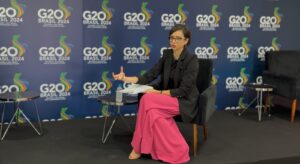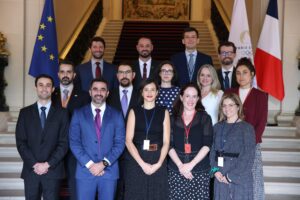Faces of Open Government: Izabela Moreira Corrêa
Open government, public integrity, and anti-corruption are central to Brazil’s governance vision. In this month’s Faces of Open Government, Izabela Moreira Corrêa, Secretary for Public Integrity at the Brazilian Office of the Comptroller General (CGU), shares her insights on advancing transparencyAccording to OGP’s Articles of Governance, transparency occurs when “government-held information (including on activities and decisions) is open, comprehensive, timely, freely available to the pub... More, fostering trust, and building sustainable institutions. From shaping Brazil’s re-democratization process to steering the G20 Anti-Corruption Working Group, she reflects on the country’s journey as a global leader in open government and its plans for the future.
You’ve had an extensive background working on public integrity and transparency in Brazil and internationally. What drew you to this work, and how has your experience shaped your approach to open government at the CGU?
My work centers on a steadfast commitmentOGP commitments are promises for reform co-created by governments and civil society and submitted as part of an action plan. Commitments typically include a description of the problem, concrete action... to citizens’ rights and social justiceTo address barriers that prevent citizens from having their justice needs met, OGP participating governments are working to expand transparency, accountability, and inclusion into all systems of justi.... Growing up in one of the most unequal countries in the world, I was often troubled by the stark disparities around me, which motivated me to find ways to improve people’s lives. Early on, I recognized that government has the potential to drive meaningful social change—provided that public institutions are robust, actively prioritize citizens’ needs, and maintain integrity.
I later had the privilege of studying at a renowned public administration school in Brazil, a public institution dedicated to advancing society socially, intellectually, and economically. This experience challenged and deepened my understanding of government and society, crystallizing my belief in the importance of good governance and strengthening my dedication to open government practices.
When I first worked at the Brazilian Office of the Comptroller General, between 2006 and 2021, I was part of a team that shaped the organization’s mandate. Initially focused on internal control, CGU’s role was expanded to include increasing transparency and fostering active engagement from civil society to ensure that governments delivered on their mandate. Over the years, this agenda grew, for example, from primarily promoting financial transparency to shifting from a culture of secrecy to one of openness. This evolution was especially evident with the adoption of a strong Freedom of Information Act and open dataBy opening up data and making it sharable and reusable, governments can enable informed debate, better decision making, and the development of innovative new services. Technical specifications: Polici... initiatives. Today, open government at the CGU encompasses a broad agenda that promotes collaboration, supports participation, advances transparency and access to information, and sets standards for public integrity.

As President of the G20 and head of the Anti-Corruption Working Group, the Government of Brazil envisions integrity and anti-corruption as key tools for advancing social justice and building a sustainable future, under an approach of “open government for sustainability.” Could you share four effective approaches or policies that Brazil has used in order to do so?
Yes, Brazil’s presidency of the G20 Anti-Corruption Working Group emphasized the role of integrity and anti-corruption measures in promoting social justice and ensuring sustainability. The Background Paper on Promoting Integrity and Anti-corruption for a Just World and a Sustainable Planet is the main document in which we outline how integrity and anti-corruption measures are essential for building inclusive institutions that promote equal opportunities, uphold the rule of law, and ensure social and economic participation.
To start with, we present a comprehensive view of anti-corruption and integrityOGP participating governments are working to root out undue influence across government affairs, because the use of public office for private gain erodes citizens’ trust in their government and its ... More as a set of strategies and instruments that should be integrated into social and economic policies to build inclusive institutions. In this regard, we emphasize that promoting integrity and tackling corruption is also about fostering trust, political action, and social participation. The paper highlights the link between corruption, inequality, and sustainability, stressing that corruption reinforces exclusion and undermines efforts to improve sustainability and reduce poverty and inequality.
Open government advances responsiveness, transparency, and accountability, and is therefore essential to creating inclusive institutions that foster sustainability, support social justice, and reduce corruption. In our Background Paper, we have a full subsection on “Open Government for Sustainability.” I would like to invite all our readers to review the document, as it reflects some of the contributions of open government to addressing some of the most pressing issues of our time.

Brazil is one of the eight founding members of OGP, and its Co-Chair year (2025-2026) will coincide with OGP’s 15th anniversary. How would you describe Brazil’s journey in open government so far, and what vision do you have for its upcoming leadership role?
As one of the OGP’s co-founders, Brazil hosted the first High-Level Conference of the Open Government PartnershipThe Open Government Partnership (OGP) is a multi-stakeholder initiative focused on improving government transparency, ensuring opportunities for citizen participation in public matters, and strengthen... More in April 2012. Brazil also served on the Steering CommitteeThe Steering Committee is OGP’s executive decision-making body. Its role is to develop, promote and safeguard OGP’s values, principles and interests; establish OGP’s core ideas, policies, and ru... from 2011 to 2017 and has been honored with two Open Government Awards.
Brazil’s history of promoting open government practices goes back to our re-democratization process, during which the country became an influential leader in open government initiatives, especially by deeply embedding public participationGiving citizens opportunities to provide input into government decision-making leads to more effective governance, improved public service delivery, and more equitable outcomes. Technical specificatio.... In the aftermath of the dictatorship era, for example, national public policy conferences were introduced to foster citizen involvement in decision-making. Public policy councils and participatory budgeting have also become key pillars of Brazil’s commitment to inclusive governance. Policy councils facilitate citizen engagement across numerous areas, including health, educationAccountability within the public education system is key to improving outcomes and attainment, and accountability is nearly impossible without transparent policies and opportunities for participation ..., social assistance, and the environment. Participatory budgeting which pioneered in Porto Alegre in the late 1980s, has inspired various initiatives across different levels of government. More recently, in 2023, the federal government introduced a participatory mechanism to the multi-year planning process (Plano Plurianual, or PPA), incorporating public consultations to gather citizens’ input on government priorities and budget allocations over the four-year planning period. Additionally, each ministry appointed Participatory and Diversity Advisors to support ministers in ensuring that public participation effectively shapes policy-making.
Since the OGP’s foundation, Brazil has developed six action plans addressing crucial areas such as education, environment, access to information, and open science. More than 130 commitments have been set within these Action Plans, engaging hundreds of stakeholders, including civil society organizations, public authorities, researchers, private investors, subnational entities, and academia.
Re-joining the OGP Steering Committee in 2024 reaffirms Brazil’s commitment to the open government agenda both nationally and globally. Our experience in advancing transparency and participation policies enables us to contribute effectively to the OGP community and support the implementation of its 2023-2028 Strategy, particularly in our region. Brazil will promote the sharing of well-established practices and innovative experiences, with a focus on enhancing the institutional environment for open government, building mechanisms, expanding knowledge and capacities, implementing measures, and advancing policy evaluation and monitoring.
We are especially pleased that Brazil’s participation on the OGP Steering Committee will coincide with Open Americas, a valuable opportunity for us to engage with the open government community in Brasília this December.
One of the commitments in the plan, “Open Contracting for Federal Infrastructure Projects,” was also submitted to the Open Gov Challenge. How will better coordination, data transparency, and community dialogue improve transparency in these projects? What impact do you hope it will have on public trust?
Investments in infrastructure are critical to the country’s socioeconomic development. Transparency and active social participation in infrastructure projects are key to safeguarding the public interest, ensuring that projects align with government objectives and meet citizens’ needs while responsibly utilizing public resources. The strong interest shown by civil society in this commitment—especially during the process of selecting themes for the sixth OGP action plan—reflects a desire for active engagement on this issue.
This commitment aims to ensure that infrastructure interventions, including large-scale projects, are both aligned with government goals and designed to meet the needs of citizens. By providing clear and accessible information, Brazilian society is able to track the use of public funds, identify opportunities and gaps, and propose solutions. Key actions include mapping best practices for transparency, participation, and social oversight throughout the decision-making process—spanning the planning, execution, and monitoring phases of infrastructure investments. We are also focusing on capacity-building initiatives and engaging stakeholders in transparency and social participation, as well as gathering recommendations for improving infrastructure transparency.
Open government strategies foster trust by creating a bridge between civil society and the government, promoting mutual understanding and cooperation. Transparency also means that governments provide insight into the complexities, limitations, and opportunities they face, which in turn helps citizens gain a clearer understanding of public decision-making. Similarly, governments that engage actively with citizens are better equipped to understand societal needs and priorities, making them more responsive and aligned with public expectations. As a result, open government practices contribute to a more informed society, encourage constructive citizen participationAccording to OGP’s Articles of Governance, citizen participation occurs when “governments seek to mobilize citizens to engage in public debate, provide input, and make contributions that lead to m... More, and create a more adaptive and accountable government—ultimately enhancing public trust and reinforcing the legitimacy of public institutions.
With Open Americas (América Abierta) in Brazil for the first time, how can this event drive global open government efforts and inspire other countries?
Open Americas will feature a series of international and national activities, including the Open Meeting for an Open Region (Abrelatam), the Regional Conference for Open Data in Latin America and the Caribbean (Condatos), BR Data Week, the Brazilian Conference on Data Journalism and Digital Methods (Coda.Br), and the Open Government Meeting.
These activities will bring together prominent international experts to discuss open government, the publication and use of open data, and topics such as transparency, access to information, civic technologies, data journalism, digital government, accountability, and equity.
The coordination of Open Americas (or América Abierta ) presents a unique opportunity to showcase Brazil’s open government practices while learning from the region’s innovations. It also underscores Brazil’s role as a global leader in strengthening democracy and advancing open government, in line with recent high-level statements emphasizing the importance of using data for the common good.
This event will be a key opportunity to address issues critical to the region, such as open data, transparency, collaborative governance, and social participation. Additionally, the meeting will explore alignment with international standards for digital governanceAs evolving technologies present new opportunities for governments and citizens to advance openness and accountability, OGP participating governments are working to create policies that deal with the ... More and open data, fostering cross-country learning and collaboration.



Silvina Reply
Excelente todo pero reiterativo sin contar como lo implementan